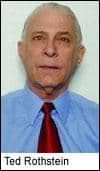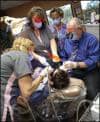A roundtable on a controversial weight-loss procedure
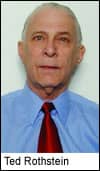 |
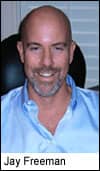 |
Ted Rothstein, DDS, PhD, has a private practice in Brooklyn, NY. He recently presented a table clinic at the Greater New York Dental Meeting titled “The Dentist’s Role in the Treatment of Compulsive Overeating: Orthodontic Jaw Wiring (OJW).” He has been providing OJW for 10 years. Jay Freeman, JD, is a lawyer practicing in Littleton, Colo, who has undergone OJW. Laurance Jerrold, DDS, JD, is the interim dean and program director of the Orthodontic Residency program at Jacksonville University. He has presented or written more than 200 lectures, articles, and multimedia presentations dealing with risk management and ethics. Elliott Moskowitz, DDS, MSd, is a Clinical Professor in the department of orthodontics at New York University College of Dentistry and a Diplomate of the American Board of Orthodontics. He is currently editor of the New York State Dental Journal. |
 |
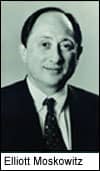 |
Q What is OJW?
Rothstein OJW is a noninvasive approach to the control of compulsive overeating. In this approach, the jaws are wired together by bonding 12 braces to the canines and first and second premolars to hold the jaws together in such a way as to prevent the intake of solid food. The jaws are wired to permit the lower jaw to move about 1 mm in every direction. The wiring is removed by the patient after 5 weeks, and the jaw is “exercised” for 5 days. Chewing gum is the best exercise. Weight loss is about 1.5 pounds per week or more if the patient exercises moderately.
Q What sort of pretreatment screening do you do?
Rothstein First, I have the patient sign an informed consent form and a medical-dental health form. Then, I decide if he or she is a good candidate—a minimum of 30 pounds overweight, a maximum of 125 pounds overweight. After a phone consultation and an in-person review, I bring them into the office for a precautionary panoramic x-ray. Then I bond the brackets and teach them how to unwire themselves—most of my patients come from other states and cannot return to be unwired. The whole process takes about an hour and a half.
Q What concrete results have you had?
Rothstein None that I can document as my official scorecard. I only have the kind remarks of the many people who I have helped.
Jerrold When one develops a novel approach or technique that he then proposes to the profession, he has an obligation to document the efficacy of the treatment proposed. If Dr Rothstein has had more than a few patients, this information should be available.
Q How did you choose OJW over other methods of weight loss?
Freeman It is very difficult for me to diet—and especially so once my weight is at a point where physical exercise is painful. I had used diet meds, but they don’t work for a long time and the side effects are unpleasant. I was not at that stage of desperation to take the drastic measure of surgery. OJW is the equivalent of an alcoholic deciding to go on the wagon and not consume alcohol.
Rothstein Jay was set to come to Brooklyn to have his OJW. In the course of completing due diligence I called Jay’s dentist, Ivan Naiman, who I eventually persuaded to do the OJW under my long-distance tutelage; the procedure went as planned, and Jay is completing OJW with Dr Naiman.
Q What was your height and weight before the procedure?
Freeman 6 ft, 1 inch; 250 pounds.
Q Describe your experience with OJW.
Freeman Completely pleasant; no pain, easily performed. Once the wires were on, Ihad a great feeling of freedom from the constant craving for food. If you know you can’t eat and can only drink, then you have little desire for food. Once in a while, I’d have a craving for food—and I’d drink some soup. I was consistently wired for 5 weeks, then on and off again since. Iunwired myself many times. I use wire snips at home, carry some in the car. I once used a fork when I needed some sustenance after a long flight without any liquids. I also rewire myself—it’s extraordinarily easy. I’ve lost 30 pounds so far, and I’m trying to lose another 20 to 30.
Q Would you recommend OJW to others in a situation similar to yours?
Freeman Absolutely, without any hesitation whatsoever.
Q What are the potential negative effects of OJW on the patient?
Moskowitz Jaw wiring in already medically compromised obese patients may result in irreversible harm and possibly death. Aspiration of vomitus has always been a real adverse occurrence of any jaw-wiring efforts.
Freeman In fact, there is little likelihood of any irreversible harm, and the likelihood of swallowing your own puke is negligible (and, I might note, is a risk factor for any anesthesia, including that given routinely by dentists). Moreover, as treatment regimens go, OJW is remarkably innocuous— compare it to the various forms of bariatric surgery.
Moskowitz While many patients would receive a “jump start” in weight reduction, at some point, the wiring would be released and patients would be able to resume their usual and habitual eating habits. Regaining of weight would most likely be the result.
Freeman Recidivism and backsliding are rampant in all aspects of life; you don’t simply dismiss a possible treatment because of possible failure rates.How about the teeth-grinders that result in malocclusion?Do dental professionals not treat the malocclusion for fear of the problem recurring? Dr Moskowitz admits that OJW can “jump start” a diet—and that is exactly the reason for OJW.
Jerrold What you’re missing is the argument that all medical people agree with: Yo-yoing is more dangerous than remaining overweight, and with the subsequent regaining of weight, the patient tends to find that he is heavier than before he had lost the weight.
Moskowitz Potential temporomandibular joint problems as well as compromised oral hygiene and periodontal breakdown might also result from jaw wiring. Nutritional guidance from qualified professionals and procedures such as gastric banding would appear to offer more predictable and long-term benefits than OJW.
Freeman The failure rate in bariatric surgery is surprisingly high—estimated at 20% in the May 24, 2004, issue of People magazine.
Rothstein In a recent survey I conducted, I spoke with 15 oral surgeons with a total of 275 years’ practicing experience about wiring jaws as a treatment for patients with broken jaws and other pathologies. Not one of them could recount any morbidity/mortality related to the experience, other than typical problems that accompany wiring. Death from aspiration of vomitus was unheard of among the group I sampled. Consequently, I believe that OJW is relatively safe when the strict protocol I have created for OJW is followed.
Q What are the legal issues with OJW?
Jerrold There are essentially four issues. The first is that the procedure be performed in a manner that does no harm to the patient in terms of decalcifications, compromise of the supporting periodontium, etc.
Freeman This is an issue of no substance, assuming that the dentist who performs OJW does so competently; if s/he does it incompetently, then the exposure to malpractice is the same as with any other procedure.
Jerrold The second issue is exposure to liability from secondary sequellae such as the possibility of aspirating vomitus.
Freeman That is what informed consent addresses.
Jerrold The third concerns informed consent. Was the patient apprised of reasonable expectations regarding the prognosis of having undergone the treatment? Was he apprised of other alternatives? Did he know of the potential risks? Finally, the most important concerns the relationship of the services rendered and whether or not one would be perceived as practicing within or outside of the scope of the state’s Dental Practice Act. If something goes wrong and the issue goes to administrative hearing, I’m quite certain that the doctor will be judged as having rendered treatment that was beyond the scope of his or her license.
Rothstein No official of any agency has notified me that by providing OJW I have breached the scope of the New York Dental Practice Act.
Freeman This is a matter of state-specific law. In Colorado, the statute defining dentistry says, in part, that “A person shall be deemed to be practicing dentistry if, in the course of legitimate professional practice, such person … Examines, diagnoses, plans treatment, or treats natural or artificial structures or conditions associated with, adjacent to, or functionally related to the oral cavity or the maxillofacial area.” Clearly, one can see the foundation for the winning argument that OJW is completely within the defined practice of dentistry.
Rothstein My firm belief is that wiring a jaw is well within the scope of “dental practice,” in that it is done in a manner consistent with general dental and orthodontic skills, with the understanding that I am providing only the mechanical means to assist the patient’s goal without actually “treating the problem.” I am one component of the patient’s health care team.
Moskowitz Orthodontists and any physician foolish enough to participate or supervise in any OJW effort will find themselves defending charges from patients who are unhappy with their weight loss results or perceive that they have been harmed in some way.
Freeman You can choose to have one risk-tolerance, but that does not mean or suggest that other dental health professionals should be similarly afraid.
Moskowitz Additionally, serious disciplinary actions from appropriate state and local regulatory agencies might very well entail censure, the loss of licensure, prosecution, and heavy fines for dentists who practice OJW for the specific treatment of morbid obesity should these agencies or regulatory bodies deem OJW to be out of the scope of dental practice.
Freeman Sure, regulatory agencies might look into it; that is another risk that a dentist can individually assess.
Q What steps can an orthodontist take to prevent himself from legal action?
Jerrold The first would be to have the “disease or disorder” diagnosed by a physician. The physician should then recommend OJW as a means of addressing the patient’s problem. The physician should then “contact” the orthodontist and request that the orthodontist perform OJW and that the patient will be jointly followed during treatment. Finally, the patient should be treated by a team that is trained in this area. This is the safest way to attempt to limit one’s exposure.
Freeman Does a dentist have substantial exposure to a real risk of loss? I submit that, with proper informed consents being obtained, good screening of OJW candidates, good dentistry, etc, the risk of loss is likely not any higher than with any other dental procedure.
Rothstein I have a set of medical and dental criteria that I use when accepting a patient for OJW to control compulsive overeating. If you go to the Web site www.drted.com, you can see that the screening of patients is done with great care to address the issues that Dr Jerrold raises.
Q Do the risks involved outweigh potential rewards?
Jerrold Certainly, obesity is the number one health risk in our society today, and it is increasingly prevalent among the orthodontic patient demographic. For this reason alone, if there is anything that we can do to help address this health issue, we should take part in the treatment process, but only in conjunction with concurrent medical oversight. Is there liability exposure? Of course there is, but no more so than when we had adult patients in intermaxillary fixation for 4–6 weeks following orthognathic surgery. The rewards are certainly there in terms of helping address a public health concern, helping individual patients, and the financial rewards that accompany treatment. On the down side, this procedure will have limited success unless the patient’s eating habits are addressed via psychological counseling. This must be a multidisciplinary approach. Psychologist, endocrinologist, primary care practitioner, dietician, and orthodontist should all be team members.
Q Why are orthodontists not qualified to be involved in weight-loss regimens?
Moskowitz The main reason is that obesity is a complex medical problem, and dentists do not have adequate training in this particular area. The causes of obesity are considered to be multifactorial. Cultural, hormonal, psychological, physical, biochemical, socioeconomic, and other factors might contribute to an individual’s obesity. The fact that we, as dentists, have intimate knowledge of the oral cavity environment, and capabilities of mechanically or chemically manipulating orofacial structures, should not remotely suggest that we have a shred of expertise at treating obesity.
Rothstein In no way do I believe that I am treating obesity. I have become part of a team that is helping patients to control their multifactorially caused overweight problem. I do believe strongly that I am compassionately and competently providing overweight patients a service for which they are grateful and willing to pay, and above all, which will make them healthier.
Moskowitz Successful weight loss in the significantly obese population is generally supervised by physicians and/or other professionals (nutritionists, physical trainers, psychologists, et al). Therapeutic weight loss is almost always the result of favorable and long-term attitudinal and behavioral changes. Wiring jaws closed with the expectation of addressing the obese patient’s long-term therapeutic needs is counter-intuitive, absurd, foolish, and potentially dangerous. Temporarily inducing an inability to have food enter the oral cavity by jaw wiring is, in my opinion, an abuse of the privilege of holding a dental license. The dental profession’s therapeutic involvement in weight loss and obesity defies legitimacy and, at best, represents an outrageous embarrassment to the entire dental profession. At worst, it would represent an egregious transgression that might very well harm the public.
Jerrold I vigorously disagree. Dentists have every right to be therapeutically involved, provided we do so at the direction of a physician and are bona fide members of the patient’s weight-loss team. We have decided that it’s OK to ingratiate ourselves into the realms of plastic surgery, facial reconstruction, sleep apnea, and orofacial pain. We have just as much right to be involved in weight-loss treatment as long as we are not the PCP.
Rothstein Dr Moskowitz seems aghast that orthodontists might be part of a team that provides services to a segment of the overweight population, which is growing at the rate of one percent annually in the United States. Underlying his abhorrence of OJW, it seems to me, is the idea that it tarnishes the image of the profession of orthodontics. I believe otherwise, and will continue to do my part to influence other members of the dental community to do the same.
Q What advances and/or proof would it take for you to approve of OJW?
Moskowitz The criteria for approving OJW as a valid therapeutic procedure (unrelated to whether dentists and/or physicians should be performing this procedure) would be the same criteria that are applied to any new or suggested therapeutic procedure. Carefully designed and implemented randomized clinical trials have become the “gold standard” for the evaluation of drugs and procedures in medicine and dentistry. Unbiased studies with valid sampling, controls, and long-term evaluations are needed before OJW or any other procedure is offered to the public.
Freeman Finally, something we can agree upon. I think longitudinal and follow-up studies would be great, but not as a predicate for performing OJW. Given the multifactorial bases of obesity, it would be impossible to correlate the success of an OJW procedure and the propriety of the procedure itself.
Rothstein I believe doctors like Elliot Moskowitz should be alert to the possibilities of obtaining, for the NYU dental facility, Medicaid funding for research on a potentially valuable treatment for selected candidates aspiring to control their compulsive overeating by OJW, a treatment method that orthodontists are preeminently well-suited to provide. I also suggest to Elliot that he apply for federal research funding to run some controlled research projects, and use the “null hypothesis” that OJW has no place in the gamut of treatment modalities now available to help compulsive overeaters restructure their lives. In the same way that we have discarded archaic notions that guide how we have delivered orthodontic treatment and replaced them with evidenced-based facts, we must do no less for OJW.

